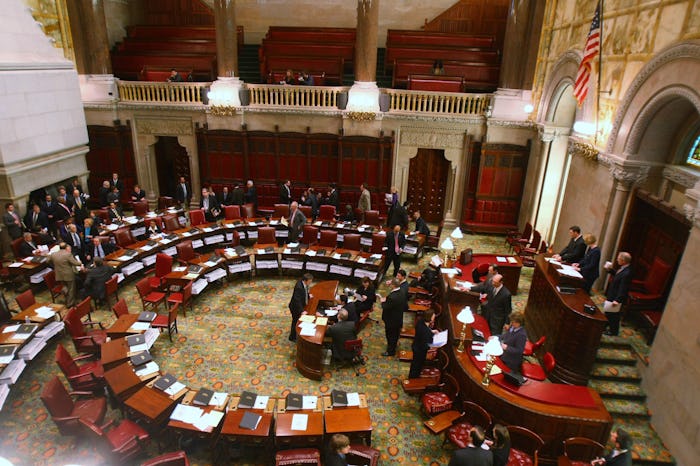News

Why The "Nuclear Option" Won't Be Invoked For General Business
Senate Republicans found themselves on the receiving end of heavy criticism Thursday, after Majority Leader Mitch McConnell invoked the long-debated "nuclear option" to push through a cloture vote on President Trump's pick for the Supreme Court. Trump's nominee, 10th Circuit Court Judge Neil M. Gorsuch, while a relatively middle of the road conservative, will likely be confirmed to the seat left vacant after Justice Scalia's death in February 2016, given that Republicans now must only obtain a simple majority to appoint Gorsuch to the Court. Though the decision has since been mourned by Democrats like New York Sen. Chuck Schumer as a dark "turning point" in Congress' history, it's unlikely that the nuclear option itself will be applied to any other general Senate business — at least not in the near future.
That didn't stop politicians on both sides of the aisle from expressing their frustration with the move. "It doesn’t have to be this way," Schumer said from the floor on Thursday. "When a nominee doesn’t get enough votes for confirmation, the answer is not to change the rules, it is to change the nominee."
Arizona Sen. John McCain, a Republican, was less measured in his response. "Bad day for democracy," McCain said as he entered the Senate chamber, according to Politico.
The decision to invoke cloture isn't unprecedented — as Republicans have been quick to point out, then-Majority Leader Harry Reid implemented the nuclear option back in November 2013 to help push through a number of President Obama's nominees, though Reid specifically excluded the Supreme Court from the change. At the time, Schumer pushed back against the maneuver, telling CNN in January this year, "I argued against it at the time. I said both for Supreme Court and in Cabinet should be 60 because on such important positions there should be some degree of bipartisanship."
But the nuclear option isn't likely to be used in general policy-making decisions either, at least not in the foreseeable future. As Politifact noted in February,
[Any] move by McConnell to change the rules on Supreme Court nominations would presumably leave untouched the 60-vote threshold for most other important Senate business, such as passing tax and spending bills. This would help keep the Senate more of a consensus-seeking body.
Lawrence Solum, a law professor from Georgetown University, told the fact-checking outlet that McConnell's decision to invoke cloture on Supreme Court appointees was undoubtedly a "major step," but added that the move "[isn't] as significant as would be going nuclear on ordinary legislation."
University of Kansas political scientist Burdett Loomis, however, wasn't so sure, telling Politifact, "Once the door opens, who knows?"
Ultimately, the one thing keeping senators from pulling similar maneuvers in the future is the idea that it may somehow either hinder their own abilities or leave them vulnerable to pushback, if and once the opposing party takes up the reins again. For his part, McCain has voiced concern over the decision to invoke, apparent hypocrisy among the ranks, and future ramifications, telling CNN's New Day on Tuesday,
I think it’s a dark day in the history of the United State’s Senate. It’s going to happen, and it’s interesting that Republicans were dead seat against it when my former colleague Harry Reid invoked it with the judges, but now it seems to be okay.
... If you can do this with 51 votes, what do you think the next nominee is going to be like? And then what do you think is going to happen when the Democrats are in the majority in the Senate?
As it stands, it appears that, following Gorsuch's appointment, it might be back to business as usual on the Hill. But with the mammoth health care vote still looming somewhere on the horizon, expect the debate to be revived again later down the road.